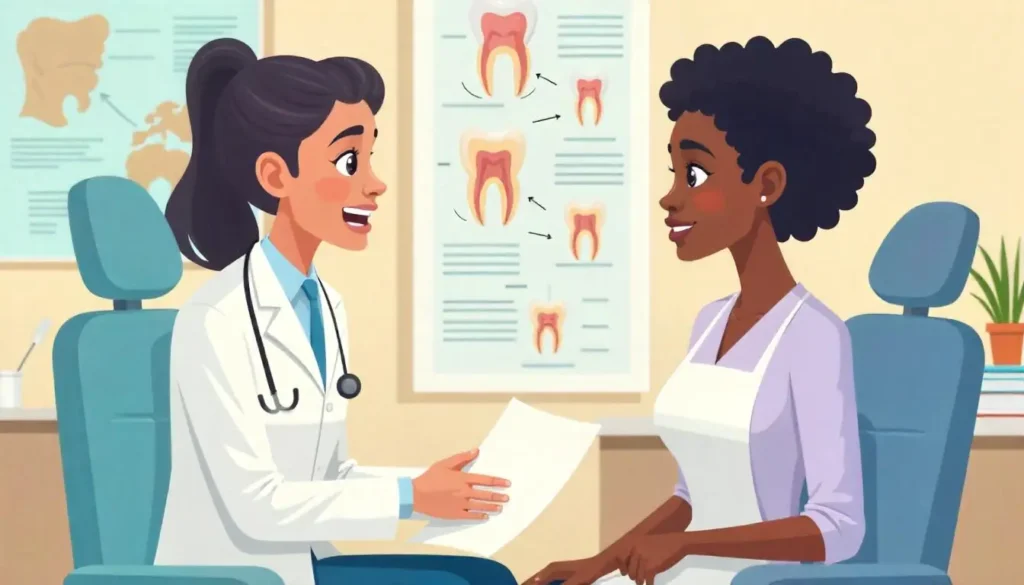Can wisdom teeth grow back? Wisdom teeth, also known as third molars, typically emerge in late adolescence or early adulthood. Due to changes in dietary habits and jaw size over time, our mouths may not have adequate space for these additional teeth, leading to various dental issues. As a result, wisdom teeth extraction is a common procedure to prevent overcrowding, misalignment, jaw pain, and potential infections.
Contrary to popular belief, once wisdom teeth are removed, they do not grow back. Once the roots of the teeth are fully developed and extracted, they will not regenerate.
However, in some cases where only part of the tooth is removed or if complications arise during the extraction process, there is a rare possibility of residual tissue regrowth that may mimic the appearance of new growth.
Maintaining good oral hygiene practices such as regular brushing, flossing, and dental check-ups is essential for overall dental health. Routine visits to your dentist can help monitor the condition of your remaining teeth and address any concerns promptly.
Remember that prevention is key when it comes to oral health, so staying proactive with your dental care routine can help preserve your smile for years to come.
Also Read: Step-by-Step Guide Wisdom Teeth Food Timeline After Surgery
Key Takeaways
- Contrary to popular belief, wisdom teeth cannot grow back once extracted, as the entire tooth, including the root, is removed.
- The sensation of regrowth is often attributed to other factors like supernumerary teeth, which are extra teeth beyond the regular set.
- Wisdom tooth extraction is typically recommended to prevent complications such as crowding, misalignment, infections, and potential cyst formation.
- Proper post-extraction care is crucial for ensuring a smooth recovery process and preventing complications like infections.
- If you experience any discomfort or pain after wisdom teeth removal, it is essential to consult your dentist promptly for a thorough evaluation.
Also Read: Cavities Between Teeth? Here’s What You Must Know!
What are wisdom teeth?
Wisdom teeth, also called third molars, are the final set of molars in our mouths. They usually come in during late teenage years or early adulthood, between ages 17 and 25.

This is when our permanent teeth are fully formed. Extra Wisdom teeth are located at the back of the mouth. They often do not have enough space to grow properly, which can cause some problems.
Wisdom tooth emergence can be very different from one person to another. Some people may have an easy time as their wisdom teeth come in with no pain.
Others may run into issues like impaction, discomfort, and infections. Because of these risks, dentists usually suggest wisdom extraction if they think future problems might happen.
Can wisdom teeth grow back after extraction?
The simple and reassuring answer is no. Once a wisdom teeth is taken out completely, including its root, it cannot grow back. The removal of wisdom teeth is a complete procedure.
It ensures that the tooth will not regenerate. This is because the extraction takes the whole tooth away, leaving no chance for a new wisdom tooth to develop.

However, some people might feel sensations or signs that seem like wisdom teeth regrowth. This can happen for reasons like supernumerary teeth coming in, leftover roots from incomplete extractions, or other dental issues that need more checking.
Must Read: Why do my teeth hurt when I wake up? Here’s What It Means!
How many times can wisdom teeth grow back?
Once your original wisdom teeth are taken out, they won’t come back. Think of it this way: your body can grow just one set of permanent teeth, which includes those wisdom adult teeth that can sometimes cause problems. Removing a permanent tooth, like wisdom teeth, is a change that stays.
But that does not mean your mouth can’t develop extra teeth. As mentioned, supernumerary teeth can show up anytime, even after wisdom teeth extraction. These additional teeth are not replacements for the wisdom teeth you had removed; they are a separate dental issue.
Also Read: Partial Dentures for Front Teeth – Regain Your Perfect Smile
What Is a Supernumerary Tooth?
Supernumerary teeth are interesting dental issues. They are extra teeth beyond the usual 32 that adults have. These additional teeth can come in different shapes, sizes, and places in the mouth. While supernumerary teeth can show up in both children and adults, they are more often seen in kids.
The reasons why some people have supernumerary teeth are still being studied. Some believe that genes, environmental reasons, and certain health problems play a part in this.

Having supernumerary teeth can cause several issues, like crowding, misalignment, and pushing against other teeth. This often requires their removal to keep good oral health.
Understanding Wisdom Teeth and Their Functions
Wisdom teeth are the third molars found at the back of our mouths. They often raise questions and concerns. These teeth usually come in during late adolescence or early adulthood.
They have confused both anthropologists and dental professionals about their purpose and importance in today’s world.

Some ideas suggest that wisdom teeth helped our ancestors eat tough, fibrous foods. However, their importance now is much less. Nowadays, we see wisdom teeth as vestigial structures, which means they no longer have the same role they used to over time.
Definition and Role of Wisdom Tooth removal in Oral Health
Wisdom teeth, also called third molars, come in at the back of the mouth. They usually appear when people are between 17 and 25 years old.
A long time ago, these teeth were important. They helped our ancestors chew tough and fibrous foods. But as diets changed, the need for wisdom teeth became less important.
Today, many people do not have enough room in their mouths for these human teeth to come in properly. This can lead to a problem called impaction.
When this happens, the tooth gets stuck in the gums or jawbone. Impacted wisdom teeth can create various oral health issues. These include pain, swelling, infection, and even damage to nearby healthy teeth.
To avoid these potential complications, dentists often suggest wisdom teeth extraction. This is especially important if the wisdom teeth threaten a person’s oral health. The procedure is usually simple, and with good care after surgery, patients can recover well.
Common Myths About Wisdom Teeth
Many people have incorrect ideas about wisdom teeth removal, even though it is a common dental process. It is important to know the truth so you can take proper care of your oral health properly. Here are some myths explained:
- Myth: Everyone needs their wisdom teeth removed.
Fact: Not everyone must have wisdom teeth removal. If your wisdom teeth are healthy, straight, and have enough space, they can stay in your mouth without causing problems. - Myth: Wisdom teeth removal always causes significant pain.
Fact: You may feel some discomfort, but new technology in dentistry makes wisdom teeth removal a much easier experience with less pain. - Myth: Wisdom teeth removal can change your face shape.
Fact: Extracting wisdom teeth focuses on the teeth and nearby tissues. It does not change the shape of your jawbone or face.
Also Read: Can I Brush My Teeth After Wisdom Teeth Removal? Expert Tips
Causes Behind Wisdom Teeth Removal
Wisdom teeth removal is often needed for many reasons that can affect oral health. One main reason is the lack of space in the jaw for these extra molars. As humans changed over time, our jaws got smaller. This left little room for wisdom teeth to come in properly.

When wisdom teeth try to grow into a full mouth, they can create several issues. These include pain, swelling, infection, and damage to nearby teeth. Sometimes, wisdom teeth may only come in partway. This can let bacteria grow, raising the risk of decay and gum disease.
Reasons for Extracting Wisdom Tooth regrowth
One main reason people get their wisdom teeth taken out is because there is not enough space in the jaw. Our jaws have gotten smaller over time.
This makes it hard for third molars, called wisdom teeth, to come in properly. When there is not enough space, the wisdom teeth can get stuck, which is known as impaction.
When wisdom teeth come in only partway, they can trap bacteria. This raises the risk of tooth decay and gum disease. It becomes hard to clean these types of teeth, allowing plaque and bacteria to build up. This can lead to problems that harm oral health.
Also, impacted wisdom teeth can cause bigger issues like cysts or tumors. These can grow around the tooth that is stuck, possibly hurting nearby teeth, nerves, and the jawbone.
Also Read: Why Experts Now Say Not to Remove Your Wisdom Teeth
Potential Complications with Wisdom Teeth
One major issue with impacted wisdom teeth is pericoronitis. This is when the gum tissue around the tooth gets inflamed. It can cause pain, swelling, and redness.
You might also find it hard to open your mouth. In some cases, this can lead to more serious infections. These may need antibiotics or more dental X-rays work.
Another problem is the chance of cysts forming around these teeth. Cysts are fluid-filled sacs that can form because of inflammation or irritation from the impacted tooth.
Most cysts are small and don’t cause any signs. However, some can grow bigger and harm nearby bone and teeth. This might need surgery to remove them.
Moreover, growing wisdom teeth roots can push against adjacent teeth. This pressure could lead to crowding or misalignment. This is especially a problem for people who have already had orthodontic treatment. Wisdom teeth might mess up the straightness that braces or other treatments provided.
Also Read: What is the Strongest Natural Antibiotic for Tooth Infection
Conclusion
In conclusion, can wisdom teeth grow back? No, they do not grow back after they are taken out the right way. It is important to know what wisdom teeth do for your oral health and to clear up any myths about them growing again.
If you notice any signs of wisdom teeth that could mean they are growing back or you have problems, see your dentist right away. Remember, getting your wisdom teeth removed is a common process that helps stop oral health issues.
Stay aware of hyperdontia, supernumerary teeth, and the signs of impacted wisdom teeth to keep your dental care in good shape. For more help or questions, talk to your dental care provider.
Frequently Asked Questions
1. Can wisdom teeth regrow after being removed?
When a dentist or oral surgeon completely removes a wisdom tooth, including its root, it will not grow back. The extraction takes out the whole tooth from the jawbone. This stops any chance of it regenerating.
2. What are the signs that suggest wisdom teeth might be growing back?
If you feel discomfort, swelling, or other oral health issues after your wisdom tooth extraction, you should see your dentist. It is unlikely that your wisdom teeth are growing back. However, these symptoms might mean other dental problems are happening and need to be checked.
3. How does hyperdontia relate to wisdom teeth?
Hyperdontia is when a person has extra teeth. This can include extra molars where wisdom teeth usually grow. These additional teeth are known as supernumerary teeth. They may need help from dental professionals if they cause crowding, pain, or any other problems.
4. What should you do if you feel like your wisdom teeth are growing back?
If you think your wisdom teeth are coming back, you should see your dentist right away. Wisdom teeth don’t grow back, but that feeling might mean there are other oral health issues. These issues need to be checked and properly treated. Don’t wait to get dental care, especially if you have severe pain or discomfort.
5. What are the symptoms of an impacted wisdom teeth?
Symptoms of a wisdom teeth that is impacted can include pain, swelling, and tenderness in the gum near the back of the mouth. You might also notice bad breath, trouble opening your mouth, or a bad taste that won’t go away. An oral surgeon can help diagnose and treat impacted wisdom teeth.
6. Why does it feel like my wisdom teeth are growing back?
Even though wisdom teeth do not grow back after they are removed, other issues can create similar discomfort after the extraction. For example, swelling while healing, changes in how your bite lines up, or the emergence of extra teeth (called supernumerary teeth) may feel like your wisdom tooth is growing back.
7. Can wisdom teeth grow back after being pulled?
Wisdom teeth can’t grow back after they are pulled or taken out. The extraction process means that an oral surgeon removes the whole tooth, including the root and tooth bud. This stops any chances of it growing back.
8. What are common treatments for wisdom teeth complications?
Treatments for issues with wisdom teeth can change based on the problem. An oral surgeon might suggest antibiotics if there is an infection. They can also recommend ways to manage pain. Often, wisdom teeth extraction is needed to fix the problem at its source.
9. Can Wisdom Teeth Really Regrow?
No, wisdom teeth cannot grow back after being taken out. When these third molars are removed for different oral health reasons, there is no chance of a new wisdom teeth forming in their place.
10. What Are Supernumerary Teeth?
Supernumerary teeth are extra teeth that grow beside the regular set. These additional teeth can lead to dental issues like crowding. This crowding may need orthodontic treatment. If the extra teeth affect the jawbone or nearby teeth, they might have to be removed.



